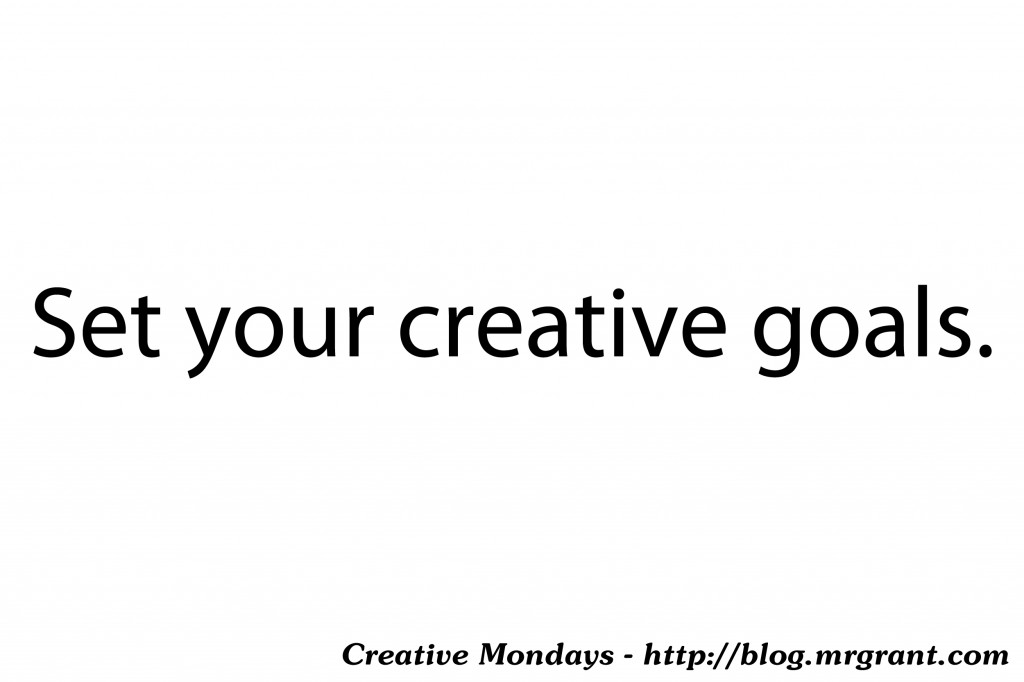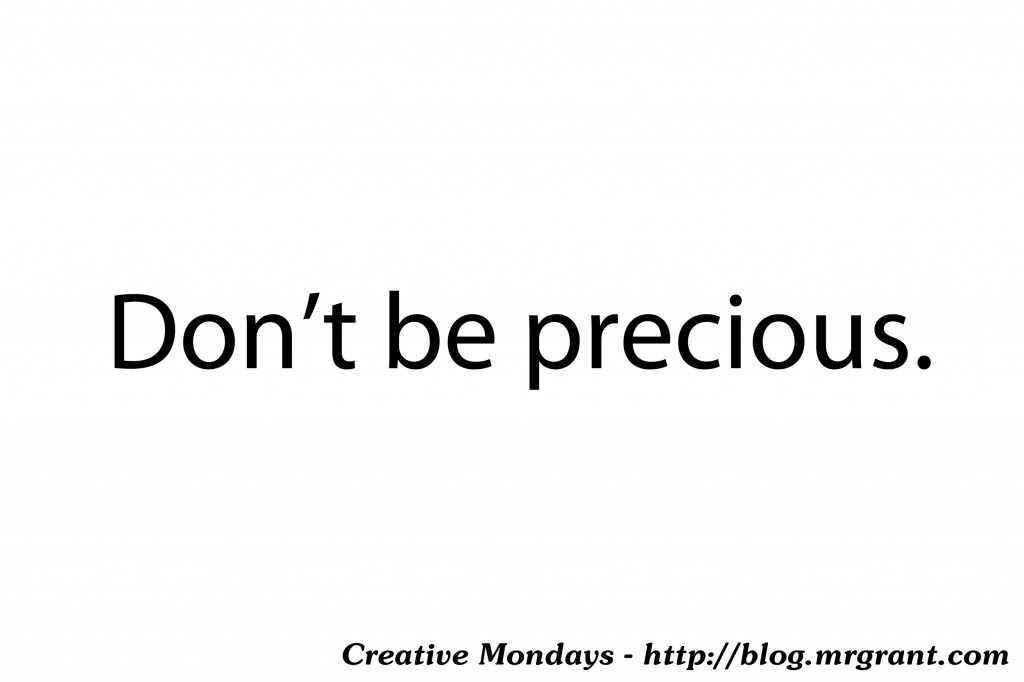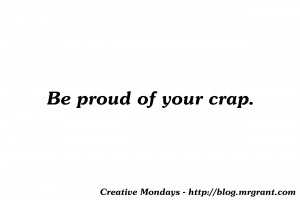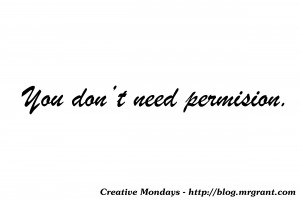Category: Creative Mondays
A year long exploration of creativity.
Creative Mondays #026 – Creative Goals

If you’re anything like me, always busy, you can gain a lot by setting creative goals. I’m not speaking of big lofty goals like: get a book published or have a gallery opening or have my play produced on the stage. These are big creative goals. I’m not saying those aren’t good goals to have, those are great goals to have. I’m talking about smaller creative goals that will lead you to those bigger creative goals.
I am a big proponent of working day by day, bit by bit on achieving those big creative goals. Those big goals don’t just happen overnight. In order to get a play produced, you have to write it. In order to have a gallery opening, you need to paint enough pieces to put into a gallery. So you need to look at those goals and see what goals you can set right now to achieve those bigger goals you have in mind.
Recently, I’ve started planning things out for the week every Sunday evening. I look at the week ahead and I jot down a list of things I want to accomplish by this time the following Sunday night. I break down all the current projects I’m working on and then come up with some things I can, conceivably, get done during the week to get closer to accomplishing those goals.
For example, I’m currently working on a podcast called The Tales of Deputy Guppy. Over the past few weeks I have the voice over artists come in and record their lines for the fourteen episodes of the season. So right now, I have fourteen episodes worth of audio that ready to be edited and produced into final shows. Now, I would love to be able to make one of my goals:
Edit the fourteen episodes of Deputy Guppy.
That, however, is a pretty big task and I have a ton of other things going on during the week, so it’s not going to get done no matter how much I want it to get done. So, I break down the goal into something more manageable:
Edit one episode of Deputy Guppy.
That is doable. In fact, I know I can do a little bit more so my goals then become:
Edit one episode of Deputy Guppy.
Choose the ‘selects’ for the next episode. (Selects are the takes by each voice actor that I really like and want to use in the final show.)
By doing this I have taken a near impossible task and broken it down into two little tasks that get me a step closer to achieving that big task.
Doing this also helps your brain wrap itself around completing that big task. Telling myself I have to edit fourteen episodes in one week basically makes my brain shut down because it knows that that is a LONG boring week of being glued to a chair editing. However, by breaking it down, my brain goes, “Oh I can do that and do that pretty quickly.”
And I’m not afraid of breaking down things even further. If it’s going to be a super busy week, I’ll make fewer goals. I will, however, do SOMETHING that gets me just a little bit closer to completing that big goal.
So why not try it this week? Take one of your creative goals and break it down into smaller pieces. Pieces big enough to be accomplished in a week’s time with the time you have available to put towards that goal. Then focus on getting those small things done this week. Then, at the end of the week, take the next little piece of that big goal and plan on getting that done the following week. If you can do this, put your mind to it and really do it, you’ll see that your big goal gets completed in no time.
—
What goal are you working towards right now. How are you going to break it down into pieces you can tackle this week. Let us know in the comments below!
Creative Mondays #024 – Don’t be precious (a lesson from Gonzo The Great)

This is one of those rules on creativity that people talk about a lot. When you are creating something, especially something you are creating with other people, you cannot be precious with your ideas. Some of them will get used, some of them will not get used. You must know this going in otherwise you’ll be setting yourself up for misery.
This rule struck me one time when I watched it happen right in front of me. In 2003, I was lucky enough to be invited to hang out on the set of a Muppet commercial shoot. It was the Dominoes Pizza Super Bowl ads that they were in. For two days I just sat, like a fly on the wall, and watched as the people behind the Muppets worked their magic. As a side note here, my favorite Muppet is Gonzo, so I kept a close eye on what Dave Goelz, Gonzo’s performer, was doing.
During one break I noticed Dave was over near the Puppet Wrangler’s table working on something. He had some items from the Craft Service table, a long puppet rod and some tools and was busily building something. Someone asked what it was and he said he felt lil Gonzo should be doing something in the background of the next shot they were filming, so he was building a stack of food for Gonzo to balance on his finger. The rig would have made it appear like Gonzo was balancing a peanut on his fingertip, then balanced on that, a soda can, and then a bag of chips and so on. It was really a great looking rig and it was built out of actual stuff! He drilled holes in a REAL peanut in order to slide the rod through.
I’d say he spent about a good thirty minutes of his lunch break on this neat little addition to the commercial. When he was done he tried it out and the effect was hilarious, it looked like Gonzo was balancing all this stuff on his finger. Everybody loved it. They tested it out on camera and it looked great. But then, somebody decided that it just wasn’t right for the scene. The Muppets mantra has always been, “Pull Focus” but this gag was pulling a little too much focus. Ultimately, the decision was made not to use it. I guess in a commercial you don’t want to pull too much focus away from the product you’re actually selling.
So, after working so hard on this little piece of puppetry fun, what did Dave Goelz do? He just tossed it aside with a smile and got ready for the next shot. His attitude was one of, “Well, that would have been fun but, oh well, no big deal.” Now, he could have been upset or fought for it or thrown a big-time hollywood star tantrum, but he didn’t. He moved on to the next order of business with a smile.
Seeing this happen really struck me. Something you work hard on, no matter how good of an idea it is, may not make the final project. This happens all the time when creating things with others and it can happen in working on your own stuff as well. A particular exchange of dialogue in your writing may be the best you’ve ever written, but if if doesn’t work with the story, you have to toss it. You can be upset for a moment, but then you have to move on with your creating.
This is a tough one. Usually us artists go from thinking everything we do is crap to everything we do is good. Sometimes, even when you know you have something good, you have to let it go if it’s not working.
Take a lesson from Gonzo: you can’t be precious with your work.
Creative Mondays #021 – You don’t need permission.
Permission.
“May I please be excused form the table?”
“May I have some more dessert?”
“May I go outside to play?”
From the time we are little we are taught to ask for permission. As we get older it seems like we’re still asking for permission.
And if you create art it seems as if you are always asking for someone’s okay before doing anything. Heck, it often seems as if all we need is someone to say, “Yes, you may make your art.” and we will be a success.
“Will you make my script into a movie?”
“Will you release my album on your record label?”
“Will you display my paintings in your gallery?”
We are still asking for permission.
I will let you in on a little secret. You don’t need anyone’s permission to create your art. You don’t. You can go ahead and create it yourself and get it out there in the world and today’s technological advances make it even easier.
When I teach my How To Podcast classes, one of the things I like to try and instill in my students is that you don’t need anyone’s permission to start doing it. You can get your message out to the world for relatively low cost. The only real investment is time.
Sure you need a few tools to record a podcast but you can now produce and publish a podcast entirely on an iPhone. You don’t need to ask anyone’s permission to do it.
I think this can be applied to a lot of other areas as well. Got a TV series idea? You can shoot a low budget version of it and put it out on YouTube. Music artist? CDBaby.com will put your music on iTunes next to Beyoncé and Justin Timberlake. Visual artist? You can set up an online gallery or even sell your artwork directly to patrons via Etsy.com.
Yes, there are costs involved in setting these all up, but what we’re talking about is permission. You do not need anyone’s permission to do any of the above ideas. You can tell Hollywood/The Music Industry/The Art World to take a hike. You’re going to put your stuff out there on your own and with things like YouTube’s ad sharing, CDBaby’s payments and Etsy’s as well, you can earn money directly from the people watching, listening or looking at your stuff. No permission needed.
Realizing that you don’t have to fit your art into the demands or constraints of others is incredibly freeing. When I was producing The Radio Adventures of Dr. Floyd, there was no censorship committee we had to run anything past. We didn’t need to ask permission from anyone else. We just created the show. We became our own censorship committee. We decided what went on the show and what didn’t. I guess, in a way, we had to run ideas past each other, but we had similar goals so there were never any problems on content.
Chris Guilbeau calls the people who decided weather or not you can do something as The Gatekeepers. We live in a fantastic time where technology lets us circumvent the gatekeepers. Yes, it would be great to have a television network, movie studio, music label or famous art gallery publicizing our art, but you’d need their permission. I say, don’t ever wait for permission. Just do it. If it is good enough, the studios, networks, labels and galleries will come to you. And if you’ll be in a much better position to negotiate with them because you’ve done it all yourself.
I feel I just briefly need to mention that if you are under 18 and still living with your parents….you do need to ask permission from them. Sorry. Also, if you are using other people’s work you, most certainly, have to ask for permission. You can’t just steal their art and make it your own without asking. My lawyer made me ad this paragraph.
So, if you are waiting to create because you need permission from someone else….forget it. Just start creating! Or if you REALLY need permission, I’ve just given it to you. No go.
Create!
—
Creative Mondays #020 – Be proud of your crap.

If you are any kind of serious creative professional, you put your all into everything you create and then you put it out into the world. And as you have continued to put things out in the world, there’s a good chance you’ve looked back at the stuff you created in the past and said, “Well, that was crap. Why did I ever put that out?”
First of all, know that that is perfectly normal to look back at your previous work and think it is crap. There are lots of creative professionals who look back at their early work and shudder. Take the early, early episodes of Mystery Science Theatre 3000. These were the twenty one episodes that were produced on the UHF station, KTMA in Minneapolis-St. Paul starting in 1988. These are known in Mystery Science Theatre 3000 fandom as the KTMA Episodes. Lots of fans want these first twenty one episodes to be released on DVD. They bombard Shout Factory, the company who puts out amazing Mystery Science Theatre 3000 DVD sets, with requests to secure the rights for DVD release. To this date they haven’t been released and they are sought after tapes on the bootleg DVD market.
I’ve heard Joel asked about getting them released and his answer is always some form of, “If people want to search them out for ‘historical’ sake, that’s fine. We just don’t want to release them on DVD because at KTMA we were still figuring out how the show worked.” Again, I’m paraphrasing, but the idea is the same. They don’t want to release those early episodes because they don’t think they are their best effort, compared to what the show later became. They are looking back at their early work and are thinking that it’s crap. (That’s my word, not Joel’s or anyone else’s who was involved in the show.)
When I first started writing comedy songs, I would put out anything that I could. I had an old MIDI keyboard hooked up to a Mac SE and would program in the lamest sounding drum and synthesizer tracks into it, then play it back and sing live into a microphone as it fed into my tape deck in my own little recording studio. These sessions produced such hits as I WANNA BE LIKE KATO (KALEN) and the hit Dr. Demento aired…once…edited…I REALLY LIKE TO EAT POTATOES. I listen back to these tracks and shake my head. These songs are the very definition of crap. And I look back and laugh because at the time I thought they were comic masterpieces and wanted everyone to hear them. To everyone who heard them, I’m sorry. They are crap. On my last comedy song release FAVORITES, I included I REALLY LIKE TO EAT POTATOES as the very last track because I thought it would be fun to see exactly how far I’ve come.
Here’s the point…it’s okay to put out crap. And even if it is crap, you can be proud of it. In many cases, that ‘crap’ leads to something very good. The early KTMA episodes of Mystery Science Theatre 3000 gave Joel and the other people on the show enough material to put together a pitch tape which landed the show on The Comedy Channel which later became Comedy Central. Dr. Demento playing I REALLY LIKE TO EAT POTATOES on his show gave me the fire to continue working on my comedy songwriting and I’d later go on to have a number one song on his show in N.R.L. (THE NURSERY RHYME LAWYER SONG).
The more ‘crap’ you put out, the better your work gets. So keep putting out crap. Crap is okay. And it’s okay to look back at all that crap and be a little proud.
—
What early work of yours can you look back at and say, “That was crap.” How much better are you now? Let us know in the comments below.[ Grant Baciocco, 3/4/14, 9:19 PM]
